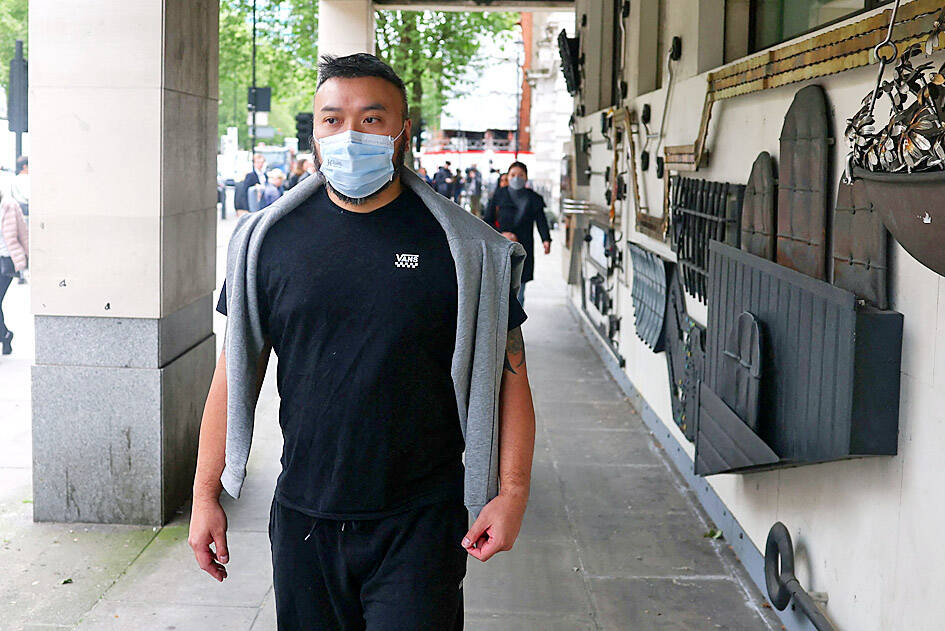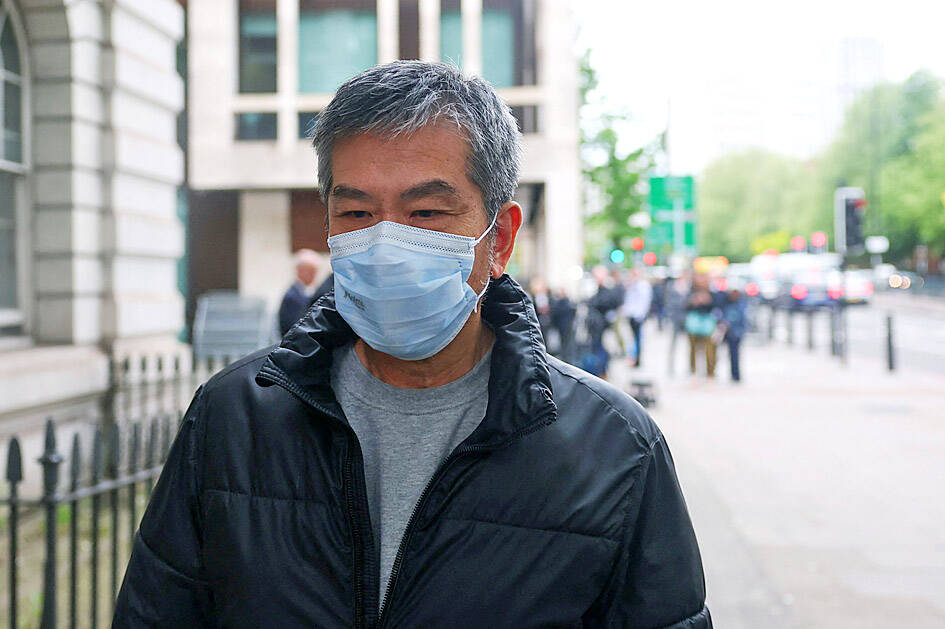The British government yesterday said it had summoned Chinese Ambassador to the UK Zheng Zeguang (鄭澤光), a day after three people were charged in the latest Beijing-linked alleged espionage case.
The UK’s Foreign, Commonwealth and Development Office was “unequivocal in setting out that the recent pattern of behaviour directed by China against the UK, including cyberattacks, reports of espionage links and the issuing of bounties, is not acceptable,” a spokesperson said.
The office said that the summons followed Monday’s announcement that three people had been charged with assisting Hong Kong’s intelligence service.

Photo: Reuters
The three are: Bill Yuen Chung-biu (袁松彪), 63, the office manager of the Hong Kong Economic and Trade Office in London; Wai Chi-leung or Peter Wai (衛志良), 38, a dual British and Chinese national who is a UK Border Force officer and ran his own private security firm; and Matthew Trickett, 37, a former Royal Marine commando who runs a private security firm.
They are charged with assisting a foreign intelligence service between December last year and this month by “agreeing to undertake information gathering, surveillance and acts of deception” in Britain, according to the charges brought in court. They are also charged with conducting “foreign interference” by forcing entry into a residential home.
All the offenses fall under the UK’s National Security Act, which introduced new measures last year against foreign threats, including espionage and interference. The charges do not name the specific Hong Kong intelligence service.

Photo: Reuters
They face a maximum possible sentence of 14 years for each charge. They were not asked to enter any pleas and are next to appear at London’s Old Bailey court on May 24. The men were granted bail, but have curfew and travel restrictions.
British Prime Minister Rishi Sunak’s Downing Street office called the charges “deeply concerning.”
However, the Commissioner’s Office of China’s Foreign Ministry in Hong Kong “strongly condemned” the UK for “cooking up charges” and accused it of a “vicious intention to interfere” in Hong Kong’s affairs.
It warned that Britain would receive “China’s firm and strong retaliation.”
Earlier yesterday, Hong Kong Chief Executive John Lee (李家超) called for full information from British authorities on the arrests of three men.
Speaking to reporters, Lee confirmed that one of the men, Yuen, was a university classmate who was photographed with Lee in a group graduation photograph from 2002.
Lee cited a statement from the Chinese embassy in London rejecting what it called “the UK’s fabrication” of the case and its “unwarranted accusation” against the Hong Kong government.
Asked whether Hong Kong authorities had spent any resources to perform surveillance on individuals in Britain, including Hong Kong activists, Lee did not directly address the question.
Separately, the head of the Government Communications Headquarters (GCHQ), the UK’s intelligence, security and cyberagency, yesterday warned that China posed a “genuine and increasing cyber risk.”
“China has built an advanced set of cybercapabilities and is taking advantage of a growing commercial ecosystem of hacking outfits and data brokers at its disposal,” GCHQ Director Anne Keast-Butler said at the Cyber UK conference in Birmingham, England.
“Through their coercive and destabilizing actions, the PRC [People’s Republic of China] poses a significant risk to international norms and values,” she added.
The GCHQ now devotes “more resource to China than any other single mission,” she said.

‘CHARM OFFENSIVE’: Beijing has been sending senior Chinese officials to Okinawa as part of efforts to influence public opinion against the US, the ‘Telegraph’ reported Beijing is believed to be sowing divisions in Japan’s Okinawa Prefecture to better facilitate an invasion of Taiwan, British newspaper the Telegraph reported on Saturday. Less than 750km from Taiwan, Okinawa hosts nearly 30,000 US troops who would likely “play a pivotal role should Beijing order the invasion of Taiwan,” it wrote. To prevent US intervention in an invasion, China is carrying out a “silent invasion” of Okinawa by stoking the flames of discontent among locals toward the US presence in the prefecture, it said. Beijing is also allegedly funding separatists in the region, including Chosuke Yara, the head of the Ryukyu Independence

UNITED: The premier said Trump’s tariff comments provided a great opportunity for the private and public sectors to come together to maintain the nation’s chip advantage The government is considering ways to assist the nation’s semiconductor industry or hosting collaborative projects with the private sector after US President Donald Trump threatened to impose a 100 percent tariff on chips exported to the US, Premier Cho Jung-tai (卓榮泰) said yesterday. Trump on Monday told Republican members of the US Congress about plans to impose sweeping tariffs on semiconductors, steel, aluminum, copper and pharmaceuticals “in the very near future.” “It’s time for the United States to return to the system that made us richer and more powerful than ever before,” Trump said at the Republican Issues Conference in Miami, Florida. “They

GOLDEN OPPORTUNITY: Taiwan must capitalize on the shock waves DeepSeek has sent through US markets to show it is a tech partner of Washington, a researcher said China’s reported breakthrough in artificial intelligence (AI) would prompt the US to seek a stronger alliance with Taiwan and Japan to secure its technological superiority, a Taiwanese researcher said yesterday. The launch of low-cost AI model DeepSeek (深度求索) on Monday sent US tech stocks tumbling, with chipmaker Nvidia Corp losing 16 percent of its value and the NASDAQ falling 612.46 points, or 3.07 percent, to close at 19,341.84 points. On the same day, the Philadelphia Stock Exchange Semiconductor Sector index dropped 488.7 points, or 9.15 percent, to close at 4,853.24 points. The launch of the Chinese chatbot proves that a competitor can

‘VERY SHALLOW’: The center of Saturday’s quake in Tainan’s Dongshan District hit at a depth of 7.7km, while yesterday’s in Nansai was at a depth of 8.1km, the CWA said Two magnitude 5.7 earthquakes that struck on Saturday night and yesterday morning were aftershocks triggered by a magnitude 6.4 quake on Tuesday last week, a seismologist said, adding that the epicenters of the aftershocks are moving westward. Saturday and yesterday’s earthquakes occurred as people were preparing for the Lunar New Year holiday this week. As of 10am yesterday, the Central Weather Administration (CWA) recorded 110 aftershocks from last week’s main earthquake, including six magnitude 5 to 6 quakes and 32 magnitude 4 to 5 tremors. Seventy-one of the earthquakes were smaller than magnitude 4. Thirty-one of the aftershocks were felt nationwide, while 79